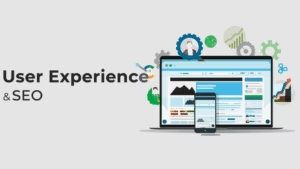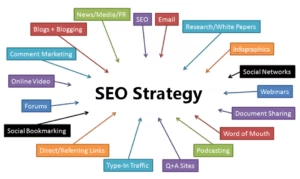Table of Contents
ToggleImagine you’ve opened a new coffee shop in your neighborhood. You’ve decorated it beautifully, the menu looks great, and the coffee smells amazing. But here’s the catch: if nobody outside your shop knows about it, how will people come in?
This is exactly how websites work on Google. You can have the best design and content (that’s on-page SEO), but if the outside world doesn’t talk about you, search engines won’t trust your site enough to rank it high.
That’s where off-page SEO comes in. In this article, we’ll explore the basics of off-page SEO in simple, human language so everyone — from students to business owners — can understand how it works.
What is Off-Page SEO?
Off-page SEO means everything you do outside your website to help it rank better on search engines like Google.
Think of it as your reputation in the digital world. Just like in real life, people judge a business not only by what it says about itself but also by what others say about it.
For example:
- If many blogs link back to your website, Google thinks, “This site must be trustworthy.”
- If people are talking about your brand on social media, Google sees it as “a signal of popularity.”
- If your business gets good reviews, it shows “real users trust this brand.”
In short, off-page SEO is about building authority, trust, and credibility beyond your website.
Why is Off-Page SEO Important?
Google uses hundreds of factors to rank websites, but backlinks, mentions, and reputation signals are some of the strongest.
Here’s why off-page SEO matters:
- Builds Trust: Just like word-of-mouth in real life, when others recommend your site, Google trusts you more.
- Boosts Rankings: Quality backlinks and mentions can push you higher in search results.
- Drives Traffic: Good PR, social buzz, and reviews bring in visitors directly.
- Strengthens Brand: The more people talk about you, the stronger your brand identity becomes.
Think of it like this: On-page SEO is your resume, and off-page SEO is your references. Google doesn’t just want to hear you say you’re great — it wants proof from others.
Key Off-Page SEO Strategies
Now, let’s break down the main strategies you can use to improve your off-page SEO.
1. Backlink Building
Backlinks are like votes of confidence from other websites. The more high-quality sites link to you, the more credible you look to Google.
✅ Example: If a popular food blog links to your bakery’s website, Google sees it as a sign your site is worth ranking.
Tips for building backlinks:
- Write guest posts for blogs in your industry.
- Create shareable resources (like guides or infographics).
- Build relationships with journalists for PR mentions.
👉 For more insights, check Google’s Link Building Guidelines.
2. Guest Posting
Guest posting is when you write articles for other websites in your niche. It helps you:
- Reach a new audience.
- Build backlinks.
- Position yourself as an expert.
Imagine writing an article about “healthy coffee habits” for a wellness blog. Not only do you get exposure, but you also get a link back to your coffee shop website.
3. Social Media Engagement
While Google says social signals don’t directly affect rankings, active engagement on social media indirectly boosts SEO by:
- Driving more traffic to your website.
- Increasing brand visibility.
- Attracting potential backlinks from people who discover your content.
Example: A small bakery posts Instagram reels of behind-the-scenes baking. People share it, and a local food blogger decides to write about it, linking to the bakery’s website.
4. Influencer Marketing
Influencers have the power to spread the word about your brand.
Example: If a tech influencer reviews your app and links to it, not only do you gain exposure, but you also get a strong backlink from their site or YouTube channel.
It’s the digital version of celebrity endorsements, but often more affordable and targeted.
5. Digital PR and Brand Mentions
Digital PR includes press releases, online media coverage, and unlinked brand mentions. Even if a site doesn’t link to you, Google still considers brand mentions as a trust signal.
✅ Example: Your coffee shop is featured in an online article about “Top 10 Cafés in Town.” Whether or not they link to you, the mention helps your brand’s reputation.
6. Local SEO (Citations & Reviews)
For local businesses, citations and reviews are game-changers.
- Citations = Mentions of your business name, address, and phone number (NAP) on directories like Google Maps, Yelp, or TripAdvisor.
- Reviews = Customer feedback on platforms like Google Business Profile.
Positive reviews not only improve trust but also encourage Google to rank your business higher in local search results.
7. Forums, Communities, and Q&A Platforms
Participating in online communities like Reddit, Quora, or niche forums helps you build authority.
But beware 🚨: Don’t just drop links. Instead, provide genuine, valuable answers, and include links naturally when they help the reader.
8. Content Marketing Beyond Your Website
Off-page content marketing means creating valuable content on platforms you don’t own.
Examples include:
- YouTube videos
- Podcasts
- Infographics shared on Pinterest
- Writing eBooks or guides shared on SlideShare
This way, you expand your reach and create multiple entry points for people to find you.
Real-Life Examples of Off-Page SEO in Action
- Backlink Example: A startup tech company publishes a free tool online. Several tech blogs link to it, boosting the company’s search rankings.
- Local SEO Example: A small pizza shop encourages happy customers to leave Google reviews. Within months, it ranks in the top 3 for “best pizza near me.”
Influencer Example: A fashion brand sends products to micro-influencers on Instagram. Their posts lead to brand mentions and backlinks, increasing search visibility.
Common Mistakes to Avoid
❌ Buying backlinks (Google can penalize your site).
❌ Spamming forums or blog comments with links.
❌ Ignoring negative reviews instead of addressing them.
❌ Focusing only on quantity instead of quality backlinks.
❌ Not diversifying strategies (e.g., only building links but ignoring PR or social).
FAQs About Off-Page SEO
Q1. What is the difference between on-page and off-page SEO?
On-page SEO = optimizations on your website (content, speed, keywords).
Off-page SEO = signals outside your site (backlinks, mentions, reviews).
Q2. Do social media likes and shares directly improve SEO?
Not directly, but they increase exposure, which can lead to backlinks and traffic.
Q3. How many backlinks do I need to rank?
It’s not about numbers. A few quality backlinks from trusted sites are more powerful than 100 spammy ones.
Q4. Can I do off-page SEO without spending money?
Yes! Start with guest posting, social engagement, and local citations, all free strategies that can help boost your online presence.
Q5. How long does it take to see results?
Usually 3–6 months, depending on competition, backlink quality, and consistency.
Conclusion
Off-page SEO is not just about getting backlinks — it’s about building a reputation, trust, and authority beyond your website.
If on-page SEO is the foundation of your house, then off-page SEO is the neighborhood chatter that makes everyone want to visit.
By focusing on backlinks, social engagement, influencer partnerships, PR, and local SEO, you can create a strong digital presence that Google — and real people — will notice.
So start today. Build relationships, earn mentions, and let the world talk about you — because in the end, that’s how search engines know you matter.




